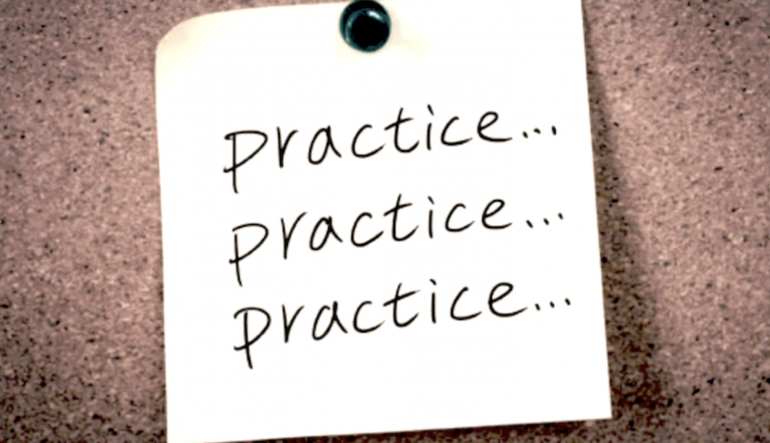My best friend growing up shared this gem of a story from 20+ years ago. While I know you’ve never done anything like this, you may know somebody:-)
It was circa 1992 on the lacrosse field at Bates College in Lewiston, Maine – a regular game between two average DIII teams who played with above-average hearts. With eighteen seconds remaining on the clock, the score is even. The Bates coach calls a thirty-second timeout and the team huddles near the sidelines. The coach, as silent as a helmet, skims his mental playbook for the right play. The players are looking to him for something – anything – to leverage in these waning moments. The referee motions for the players to return to the field. As the players break the huddle, the red-faced coach nervously barks, “We gotta score a goal now!”
Wait. What? My buddy thought to himself, “did he just say that?” Yep. Yes, he did. Thanks, coach. Brilliant! Here’s the deal. They end up winning the game. Lucky break? Nope. The coach came oh-so-close to breaking his arm, patting himself on the back for his sage advice and coaching genius. We’re rarely so lucky. Success can indeed be a poor teacher.
Now, nobody will ever confuse the Bates Bobcats athletic program with an athletic powerhouse but c’mon now. The ~$80k tuition dished out (even after inflation adjusted back to 20th-century dollars) should entitle the players to better coaching than this, right? Here’s the problem, this coach is doing his best. His twenty years of coaching earned him the “experience” badge. He’s trying to be helpful.
Everybody loved him – the proverbial “good guy” who would’ve been mortified to know what thoughts were going through the minds of these young players.
How many times does this happen in sales? A lot. Admit it. It’s like therapy. As the leader, you’re trying to provide actionable advice and coaching that makes a difference in that big meeting that will make the year or salvage the quarter. Instead, you blurt out the functional equivalent of “we gotta score a goal now!” Maybe it was “we have to close this deal” or “we can’t lose this one.”
Why does this happen? Oftentimes, the problem arises because we aren’t prepared to execute the basics at the most stressful and critical times; therefore, we freeze when we can least afford to do so. We practice in the game and think we are clutch performers – think Big Papi at the plate for the Red Sox down in the count 0-2 in the playoffs. (Sorry, I’m from Boston)
We convince ourselves we’ll rise to the occasion when necessary, but that’s not how it works. Never. Ever. Decorated Navy SEAL, Marcus Luttrell quipped: “you play like you practice and practice how you play.” Ok. What if you don’t practice? Has this happened to you? It’s certainly happened to me more times than I care to remember.
How can these embarrassing and costly situations be avoided? The key word is preparation. Athletes we deem “clutch” make it look easy. It’s because they practice more hours daily than the average teenager spends on social media – for years and years. During my time in the Marines, my Parris Island drill instructors mercilessly ensured we never forgot the six P’s– Proper Preparation Prevents Piss Poor Performance.
For thirteen weeks on the island devoid of all sympathy, it was 100% stress always. Why? War is stressful. People die when mistakes happen. Thankfully, we’re in a different business, but the same principles apply. Too often, we enter critical situations woefully unprepared. It happens. A recent study reported that 82% of C-level executives believe salespeople are unprepared for meetings. My experience, and anecdotal conversations, support this statistic. My sense is you may agree. How can sales coaches change the game?
While there are numerous plays to pull from the coaching playbook, today we’ll focus on one of the most effective ways to up-level skills, improve confidence and execute more consistently – role play. If you don’t like those words, call it practice, simulation – whatever floats your boat. The key is to practice in situations that most closely resemble your reality. Anders Ericsson called it “Deliberate Practice.”
Role-playing specific scenarios is a tool in your coaching toolbox that can help your salespeople practice and prepare in a way that increases the odds they will execute better when it counts.
Anders’ framework has four components to help maximize performance and minimize surprises when it counts the most. They are:
- Practice Specific Situations: Common scenarios such as the “two-minute offense” in football or introducing the guest speaker at a big meeting, are helpful reminders to focus on specific situations. You can’t practice the entire game or meeting, only small pieces.
- Intense Focus & Repetition: Newsflash. It’s not a one-and-done exercise. It’s more akin to a basketball player getting feedback after 20 free-throws, and then incorporating that feedback into the next 20. and the next 20, and the 200th shot. You get the idea.
- Frequent Discomfort: Getting better is not comfortable. They’re called “growing pains” for a reason. You’ve heard “growth happens beyond the comfort zone.” The best, in any business, seek comfort in discomfort.
- Immediate Feedback from a Coach: This is the secret ingredient to accelerate growth and improvement in any skill. The key is providing timely, thoughtful, and actionable feedback and then making sure it’s actioned upon right away.
Be the coach you want to be, not “Captain Obvious.” You still may not be a genius but you might help your people achieve more than they ever thought possible! There are lots of ways to do this. I know you have many ideas and stories.
Please share!






